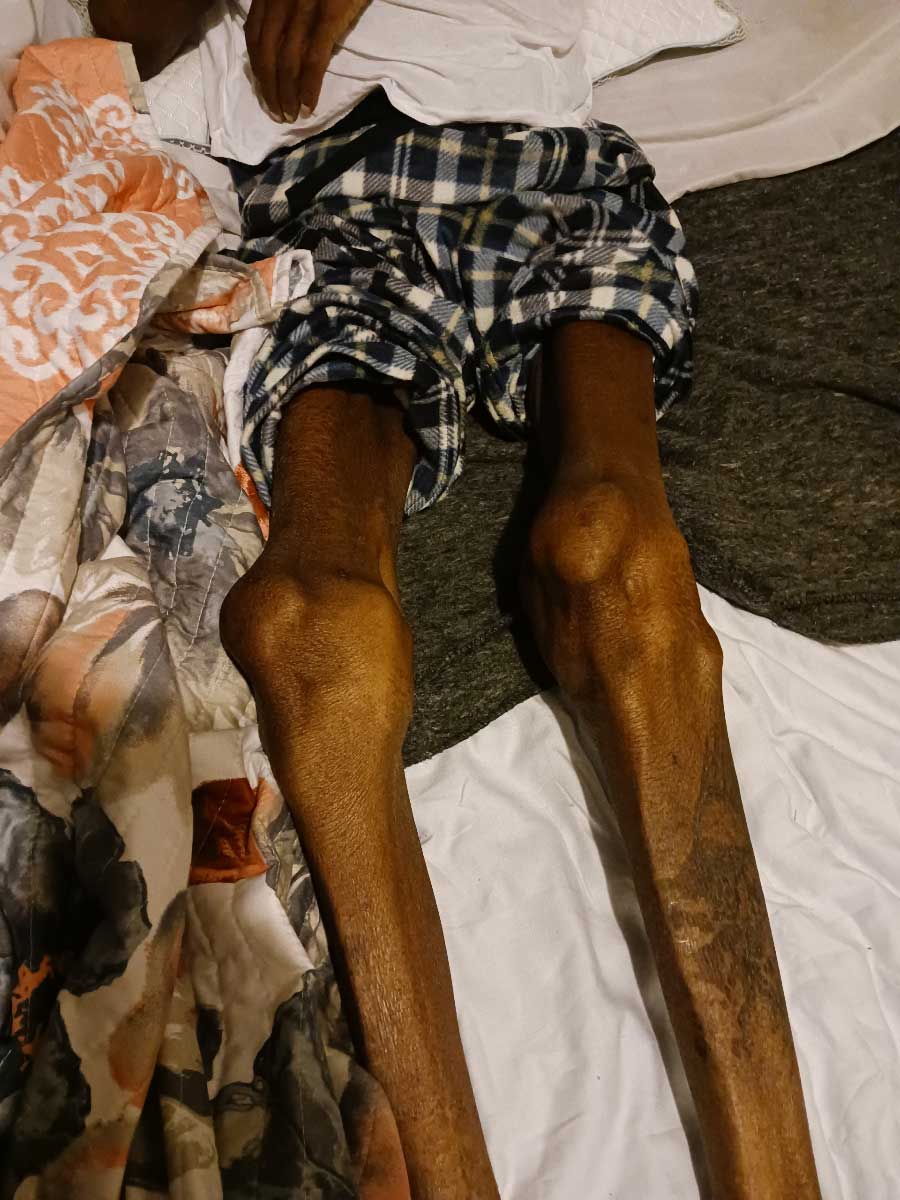Antonio Arnez Smith, 45, was severely emaciated when he was released from Kilby Correctional Facility in Montgomery on October 23, as shown in photos released by his family. He was in excruciating pain, completely incapacitated, and covered in bed sores after suffering medical neglect at the prison, his family said. He died just four days later.
“Once I wheeled him out of that prison all he could was cry,” Mr. Smith’s sister, Travella Casey, told Alabama Political Reporter. “He said, ‘I can’t believe they let me get to this point before they let me come home. I look like a damn skeleton these people done killed me.’ All he could do was cry.”
Mr. Smith was incarcerated at a minimum security work release center when he began to complain of back and shoulder pain in September 2022, according to medical records provided to al.com. He had to wait six months for biopsy results, which showed he had stage 4 lung cancer.
Mr. Smith had been classified as “minimum custody”—Alabama’s lowest custody designation for people who do not pose a significant risk to public safety and can be trusted to work outside the prison without direct supervision—since at least 2018, APR reported.
But despite his minimum classification and good behavior record, Mr. Smith was moved in January to Kilby Correctional Facility, a maximum-security prison, purportedly to receive treatment that was not available at the honor farm, his family said.
“He’s getting worse by the day and it’s like he’s been taken there to die,” Ms. Casey told al.com.
But he did not begin receiving chemotherapy until May, according to medical records reviewed by al.com.
By that time, his weight had fallen dramatically—from 140 to just 104 pounds, leaving Mr. Smith unable to move on his own, his sister said. Ms. Casey, who spoke with her brother nearly every day, said he requested a feeding tube to stop the rapid weight loss.
Severe pain prevented him from sleeping more than about two hours each night, she said.
His family applied for medical furlough, a program designed to allow the release of terminally ill people who pose no threat to public safety. The request was denied—because, ADOC Commissioner Jon Hamm said, Mr. Smith still had the capability of “committing crime” and had been convicted of murder.
Alabama officials rarely use the medical furlough program. Only seven people were granted medical furlough in the first 10 months of 2022, according to al.com, and only three were granted in 2021.
Kilby’s medical department provided no assistance to Mr. Smith, his sister told APR, because they did not deem him “incapacitated”—even though he could not even get to the bathroom by himself and was often left in his urine. His sister said he had to pay other incarcerated people to help him just to get out of bed. When they spoke on October 5, Mr. Smith told his sister he had not been able to bathe in 10 days.

APR published this photo showing Mr. Smith’s condition when he was released to his family.
Mr. Smith’s family finally obtained medical furlough in September, but his release was delayed another 30 days. He was so frail when he was released that his daughter could not even hug him. It hurt him to be touched, his sister said. He couldn’t even lift his head on his own.
“We didn’t get my brother home, we got a skeleton home,” Ms. Casey said, adding that the family had to pay for Mr. Smith’s funeral.
Representatives from ADOC and prison medical provider YesCare told Mr. Smith’s sister that he was still the property of the state and would be returned to prison if the family posted photos of him online or took him to an outside doctor, APR reported.
Mr. Smith was just 22 years old when he was arrested in the 2000 shooting death of his girlfriend. He had not been in trouble before, Ms. Casey said, and both Mr. Smith and a witness maintained that the shooting was accidental.
Houston County District Attorney Doug Valeska nonetheless charged Mr. Smith with murder. He was convicted and sentenced to 99 years in prison.
He completed several education programs, al.com reported, but was denied parole in 2021.
Parole rates in Alabama have plunged in recent years. WBHM reported this week that despite guidelines that recommend a grant rate of 80%, the rate in 2022 was only 10%—the lowest in the nation. It was half that—just 5%—in August.
If Mr. Smith had been granted medical furlough in May, his family could have gotten him help, Ms. Casey told APR. Instead, she said, he was medically neglected and suffered a rapid, agonizing decline.
“You held him to the point where he didn’t have a chance,” Ms. Casey said. “We know there was a lot of medical neglect because of the fact of the condition he was in. Just to think about him being in that prison knowing that he couldn’t physically do anything for himself.”